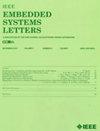CollectiveHLS: Ultrafast Knowledge-Based HLS Design Optimization
IF 1.7
4区 计算机科学
Q3 COMPUTER SCIENCE, HARDWARE & ARCHITECTURE
引用次数: 0
Abstract
High-level synthesis (HLS) has democratized field programmable gate arrays (FPGAs) by enabling high-level device programmability and rapid microarchitecture customization through the use of directives. Nevertheless, the manual selection of the appropriate directives, i.e., the annotations included in the high-level source code to instruct the synthesis process, is a difficult task for programmers without a hardware background. In this letter, we present CollectiveHLS, an ultrafast knowledge-based HLS design optimization method that automatically extracts the most promising directive configurations and applies them to the original source code. The proposed optimization scheme is a fully data-driven approach for generalized HLS tuning, as it is not based on quality of result models or meta-heuristics. We design, implement, and evaluate our method with more than 100 applications of Machsuite, Rodinia, and GitHub on a ZCU104 FPGA. We achieve an average geometric mean speedup of x14.1 and x10.5 compared to the unoptimized, i.e., without HLS directives and optimized designs, a high design feasibility score, and an average inference latency of 38 ms.CollectiveHLS:基于知识的超快 HLS 设计优化
高级综合(HLS)通过使用指令实现高级器件可编程性和快速微体系结构定制,从而使现场可编程门阵列(FPGA)平民化。然而,对于没有硬件背景的程序员来说,手动选择合适的指令(即包含在高级源代码中用于指导综合过程的注释)是一项艰巨的任务。在这封信中,我们介绍了一种基于知识的超快 HLS 设计优化方法 CollectiveHLS,它能自动提取最有前途的指令配置,并将其应用到原始源代码中。所提出的优化方案是一种完全由数据驱动的通用 HLS 调整方法,因为它不是基于结果质量模型或元启发式方法。我们在 ZCU104 FPGA 上用 Machsuite、Rodinia 和 GitHub 的 100 多个应用程序设计、实现和评估了我们的方法。与未优化(即不使用 HLS 指令)和优化设计相比,我们实现了 x14.1 和 x10.5 的平均几何平均速度提升、较高的设计可行性得分以及 38 毫秒的平均推理延迟。
本文章由计算机程序翻译,如有差异,请以英文原文为准。
求助全文
约1分钟内获得全文
求助全文
来源期刊

IEEE Embedded Systems Letters
Engineering-Control and Systems Engineering
CiteScore
3.30
自引率
0.00%
发文量
65
期刊介绍:
The IEEE Embedded Systems Letters (ESL), provides a forum for rapid dissemination of latest technical advances in embedded systems and related areas in embedded software. The emphasis is on models, methods, and tools that ensure secure, correct, efficient and robust design of embedded systems and their applications.
 求助内容:
求助内容: 应助结果提醒方式:
应助结果提醒方式:


